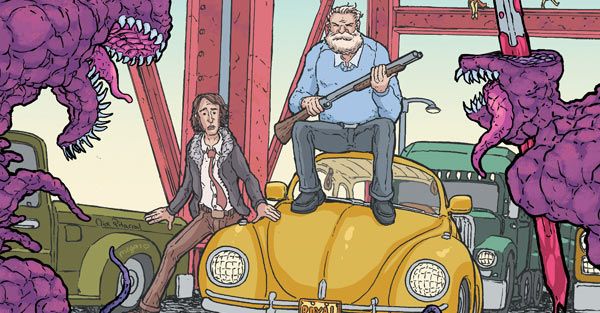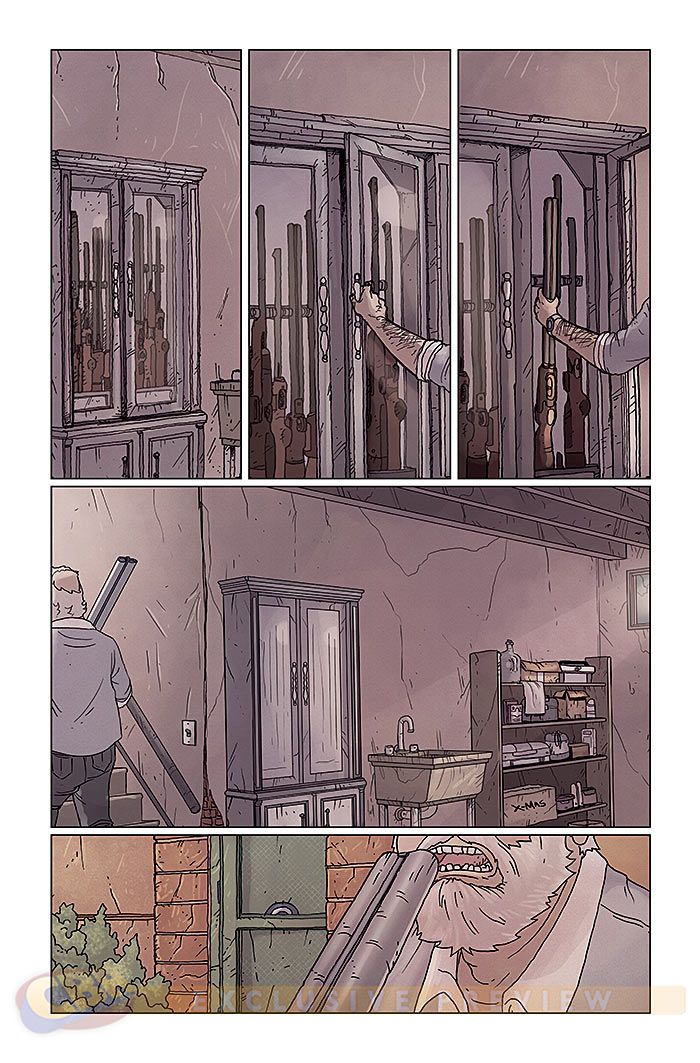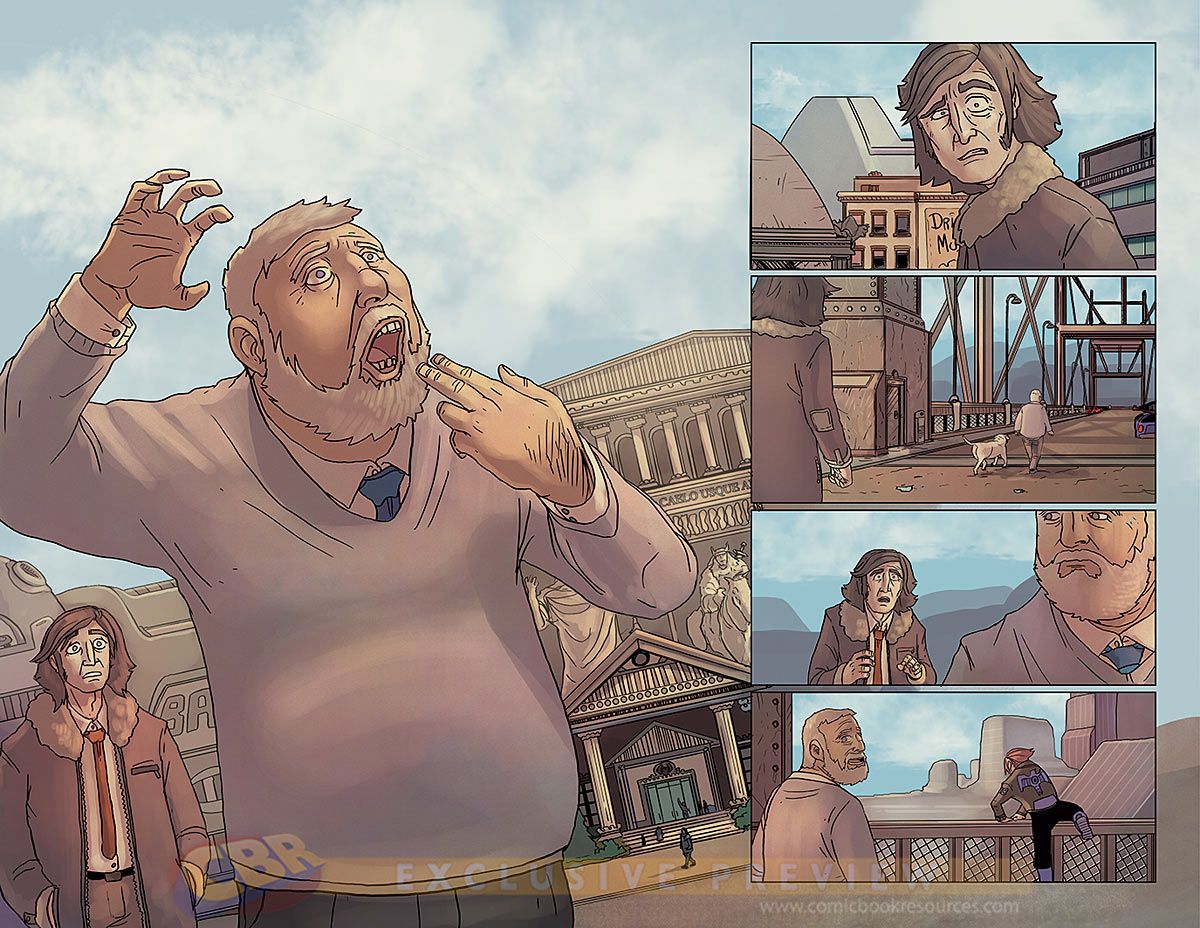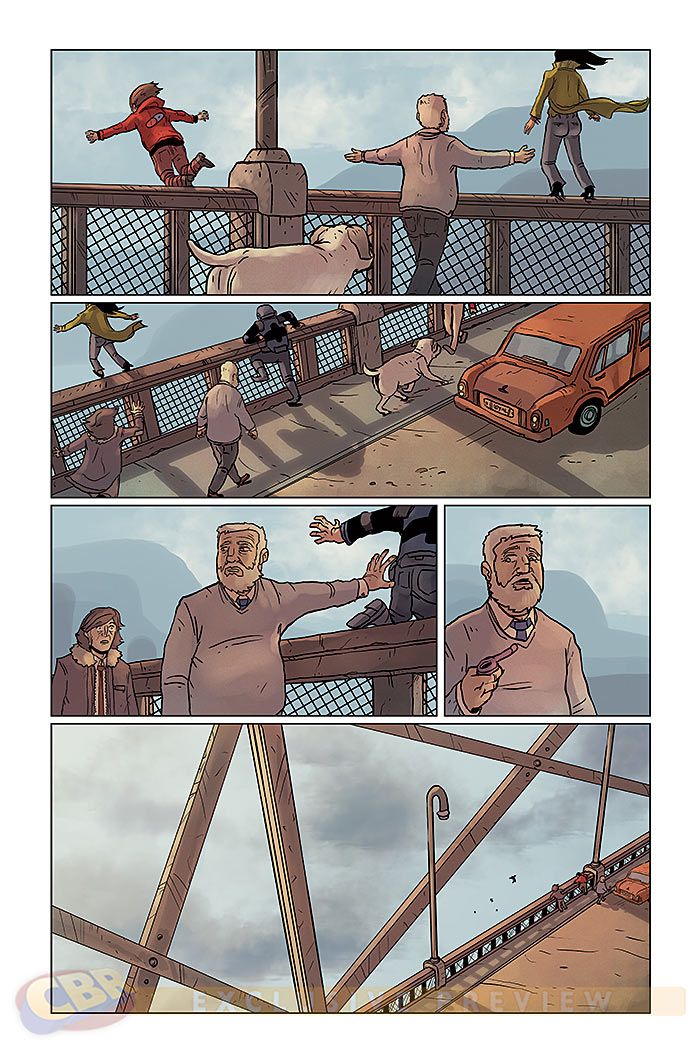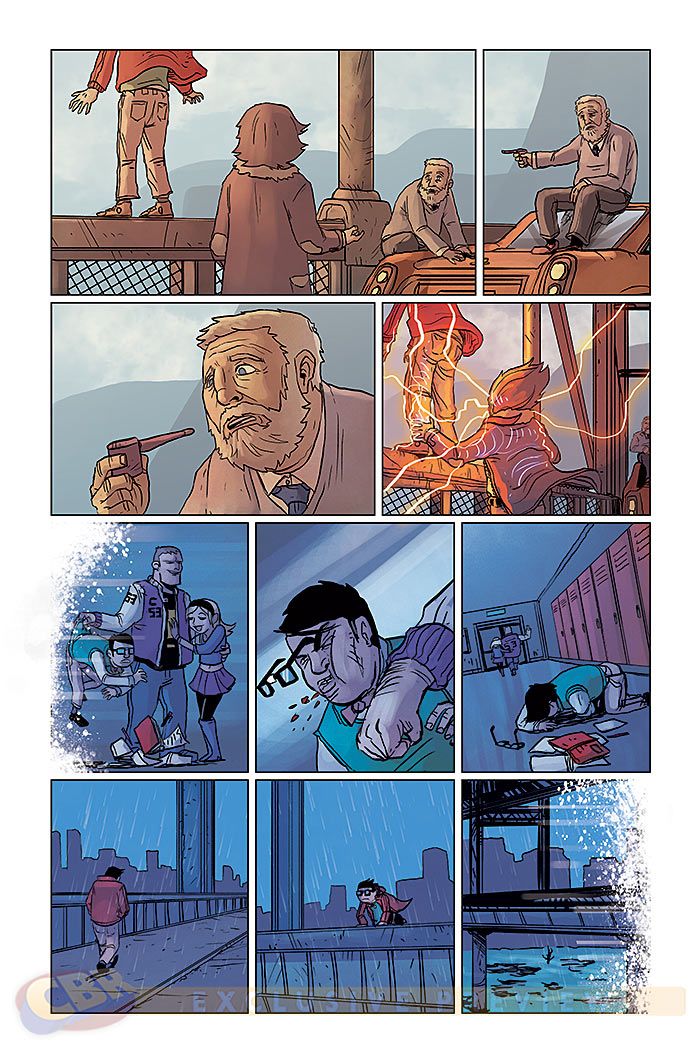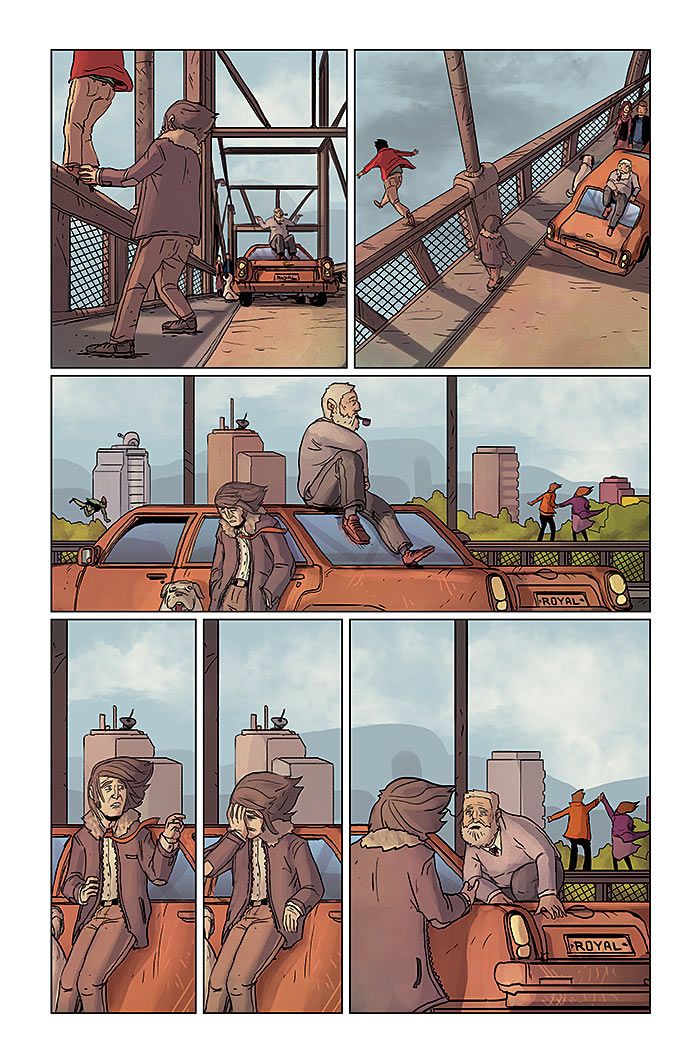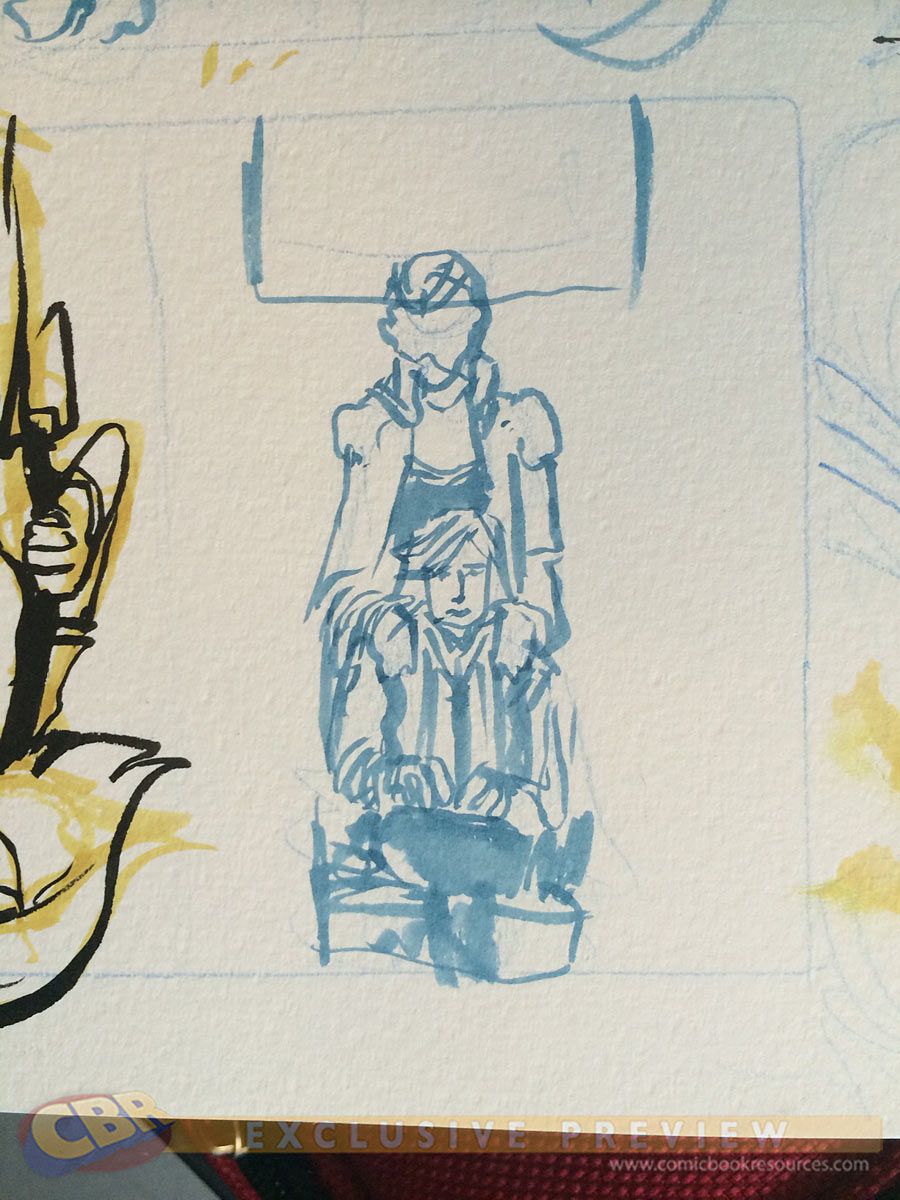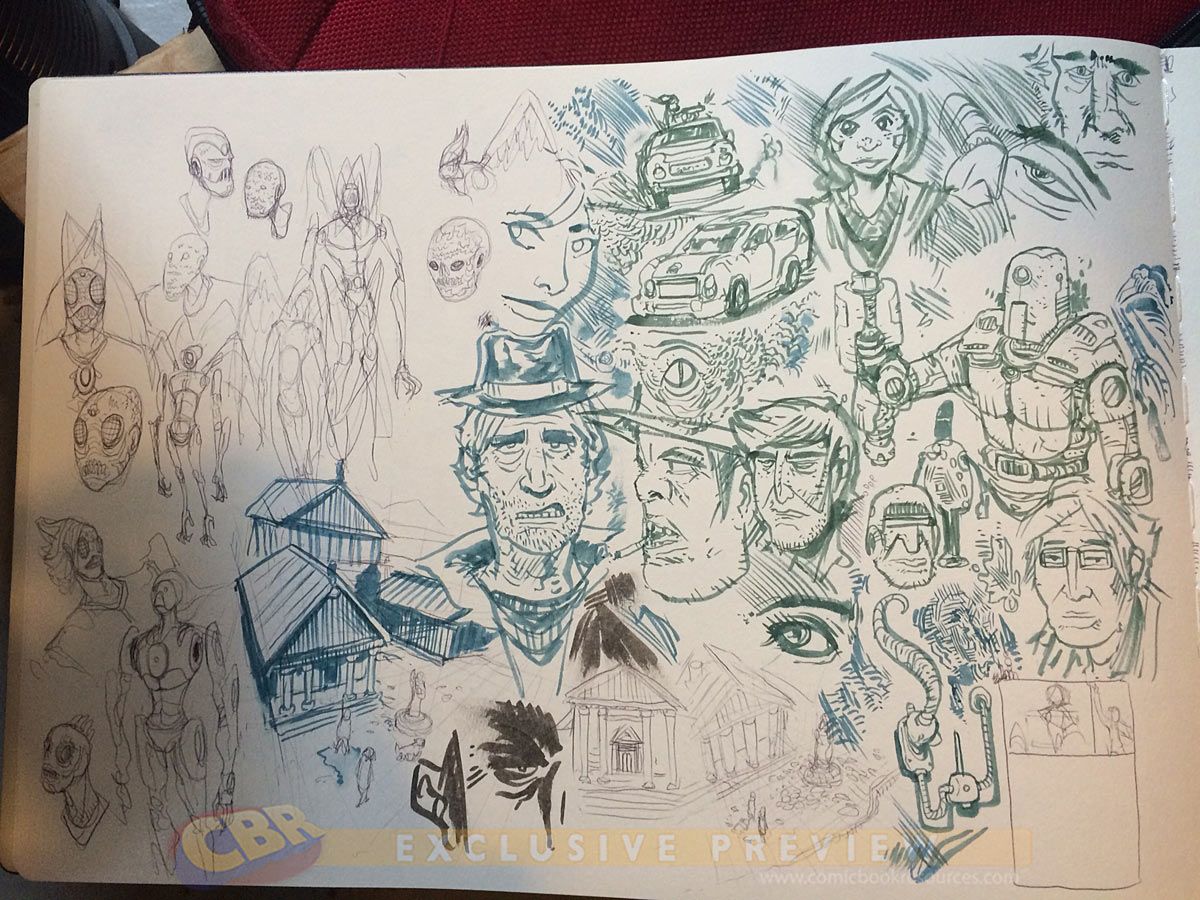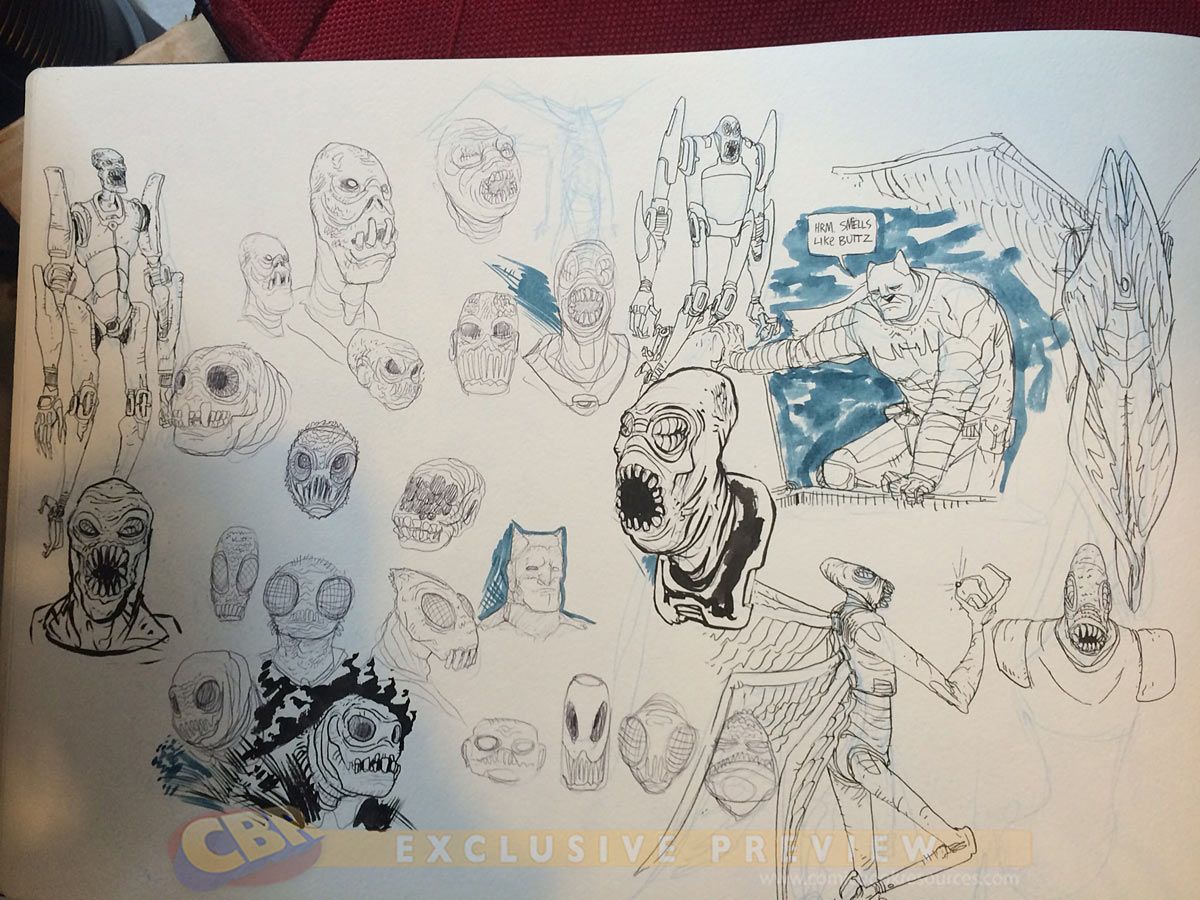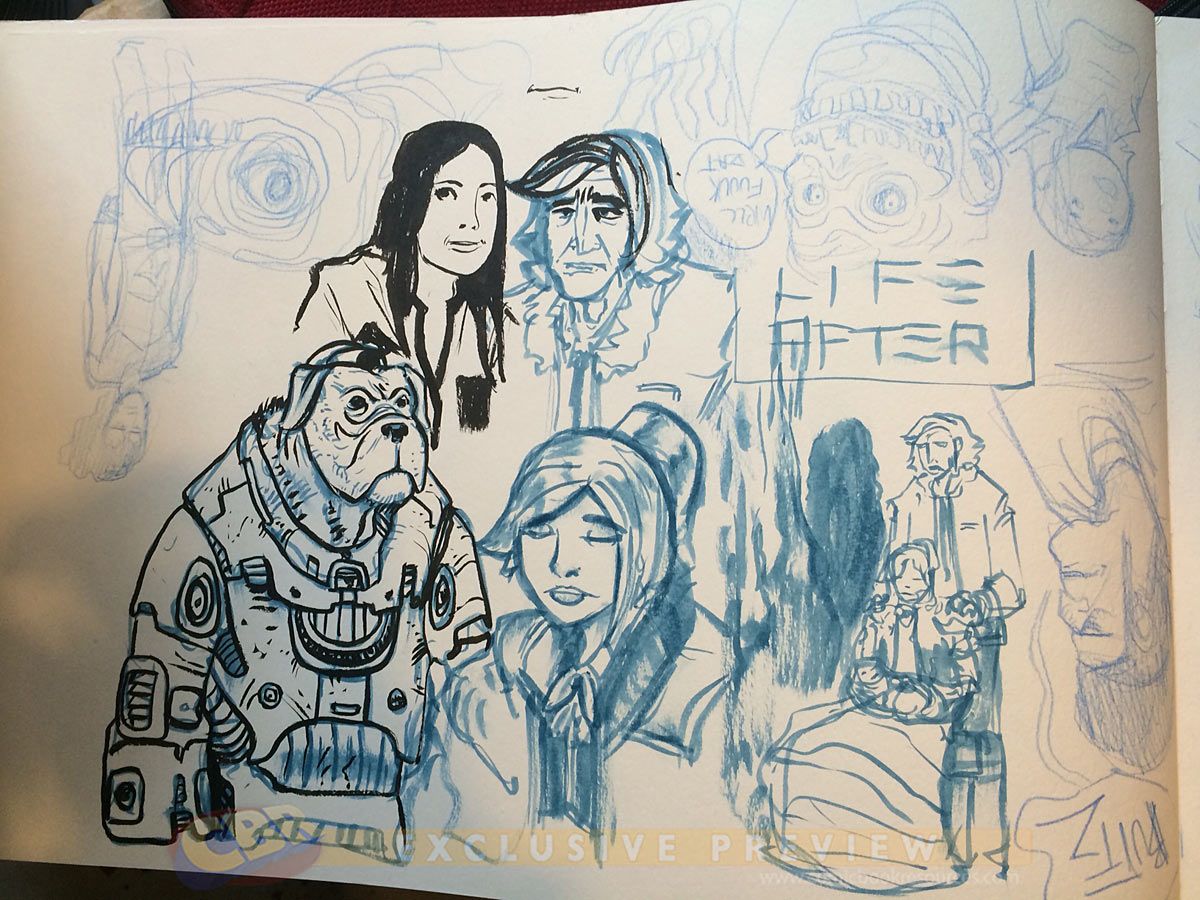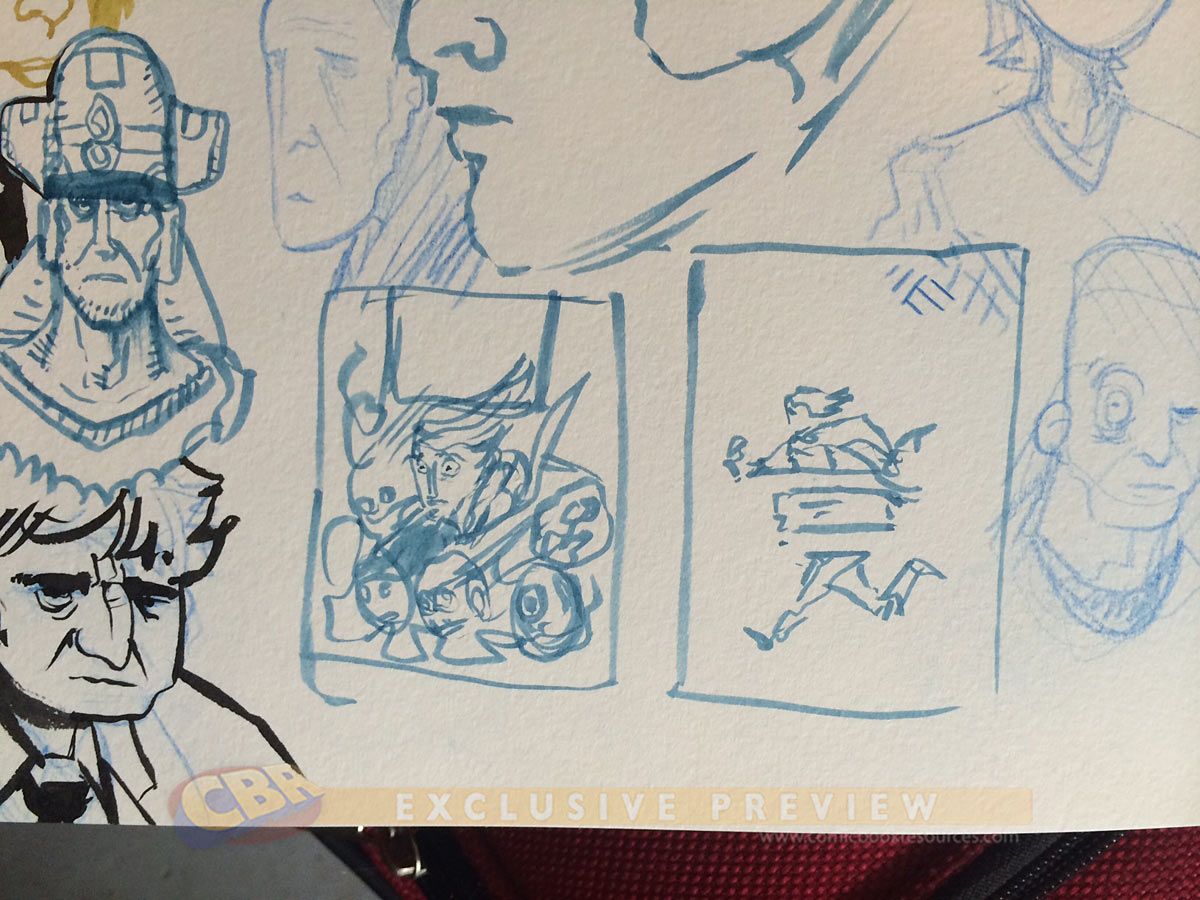Joshua Hale Fialkov's July-launching Oni Press series "The Life After" is many things: coming-of-age story, a chance to write one of the great writers of literature -- but above all, it's a series that allows Fialkov to explore and express his thoughts about modern religion. The series at its core focuses on Jude, a man who keeps repeating the same day over and over again until he breaks the cycle, only to find out he's trapped in purgatory for those who committed suicide on Earth.
"The thing about the book, and the thing that always bothered me was this idea that somehow we have this all-knowing, all-loving, all-powerful being who is extremely petty about what people can and can't do," Fialkov told CBR News. "And it never made sense to me. You read about Jesus and that guy loves everybody! He was turning the other cheek, that's what he did! That's what he was known for, he was a cheek-turner. And so the idea that God would be petty enough to categorize people instead of being able to forgive and love and all those things always sort of sat wrong with me. It's one of those things that drove me away from religion. The idea of it came when [we said], 'Let's tell a story about that.' Why? Why are there these arbitrary rules?"
Among those arbitrary rules are the consequences traditional religious dogma lays out for those who commit suicide, which Fialkov says always bothered him, making it all the more fitting as a central focus of "The Life After." "Suicide is not something that you do out of selfishness, it's not something you do out of greed, it's not something you do out of anger -- suicide at its core is hopelessness," he said. "It's like you've lost, you've lost at everything. You have nothing left, and so you kill yourself. And it seems so horrible that those people, that God would be like -- specifically to them -- 'Well, you just hang out forever. You get nothing.' You go to purgatory or you go to hell, depending on which faith you believe in, and you just sit there when the fact is that these are people that just want the pain to stop.
"That was the jumping-on point for the idea," he continued. "What's that like? You kill yourself because you want to get out of this situation you're in, and you find yourself in the same situation, but forever. That is the definition of cruel and unusual punishment, which is not supposed to be God's bag -- I would think."
RELATED: WC14 EXCLUSIVE: Fialkov Calls Forth Dynamite's "The Devilers"
Oddly enough, Fialkov is also writing a second religion-based book for Dynamite Entertainment, "The Devilers," which he describes as "a macho action version of my philosophical self," while "The Life After" is "much more the art-house version." Although he admits that "Devilers" is likely the series that needs the expert knowledge of religion, Fialkov noted that he has a "pretty good knowledge of religion," and it's not the intent of "The Life After" to focus in on one religion's belief system in particular.
"I'm trying to keep it that way so that it's not about any specific religion, it's not about any specific belief structure, it's not beating up on anyone," the writer said. "When you stop believing in empirical evidence, when you choose faith over data, there's going to be inherent logic problems. I don't want to beat up on any one religion because every religion has that. There is stuff in being Jewish, stuff in the Torah that's just nasty and mean; just like there's stuff in the New Testament, just like there's stuff in the Koran, just like there's stuff in the Mahabharata. When you look at all these things, there's a lot of the wrong lesson. If all religion came down to 'Do unto others,' which is really does, that's really what it comes down to."
While Jude is the protagonist of "The Life After," Fialkov chose a different character to help express his point of view. (Incidentally, the writer describes that character as "the most egotistical one I could have -- that's not true, it's not God.") During the course of the debut issue, Jude meets up with Ernest Hemingway, Nobel Prize-winning author of "The Sun Also Rises," who committed suicide in the summer of 1961.
"Ernest Hemingway serves the purpose of having the same viewpoint as I do -- not so much about religion, but about being sure," Fialkov said. "Hemingway is a guy who knows the rules. Hemingway is a guy who knows when he's breaking them, he knows his limits -- he was a man. He was a man's man. He knew what he was capable of, he knew what those limits were and he constantly pushed them, and now he's in a place where he doesn't know. Now he's in a place where his understanding of it -- as we see in the course of the first arc -- his understanding of the world he lives in for the first time is not what he wants and not what he can understand."
According to Fialkov, making Hemingway a character in "The Life After" actually started as a joke between himself and series artist Gabo.
"Talking to Gabo about the book, I said, 'The thing is, for someone else to be awake in this world, it would have to be because being awake in the afterlife is the most boring day.' That's what it is. They're all trapped in their most boring, repetitive day, over and over. It's perpetually mediocre," he said. "The joke is, if there's one guy who has never had a mediocre day in his life, it's Ernest Hemingway. That guy is amazing -- just him sitting on his ass, he had 11-toed cats! Everything he did had this layer of the fantastic to it, and that's part of how we view him. So I thought, 'That's the guy.' That's the guy who will be there and say, 'Well, this is just another story I'm going to tell people' even though he's never going to tell anybody."
(It helps, Fialkov noted, that Oni Editor-in-Chief James Lucas Jones, one of the series' editors, is a "semi-expert" on Hemingway.)
"By the way, name another writer, another historical figure who was an author that committed suicide that was also able to be a physical threat," Fialkov continued. "Not a lot. That guy could wrestle bears, no problem."
While Hemingway might represent the solidarity of being sure, to a certain extent, Jude is the other side of that coin. "You put the two guys together, and you have the one guy that isn't sure and doesn't know what he's supposed to do or where he's supposed to go, and is looking at it through the eyes of naivete; versus the guy who thinks he knows everything and is looking through it through overconfidence," he said. "You combine those two and you get this interesting dynamic. You have Hemingway leading him around, telling him what the world is, when the fact is that he has no more idea than an ant knows what our world is like."
Indeed, "The Life After" is as much a philosophical exploration of religious dogma as it is a coming-of-age story for Jude, which Fialkov says is a natural extension of what he's written in the past.
"I'm of the school that there's two types of stories: there's coming-of-age stories and there's love stories, and that every good coming-of-age story is actually a love story, and every love story is actually a coming-of-age story," he said. "'The Bunker,' for all of its complexity, is really a guy finding out he's going to grow up to be a monster. That's at its core -- what happens when you find out you're going to be a monster. What journey do you go on? You look at 'Life After' through that same lens, and it's about Jude has to come to terms with why he is where he is. His thing is he's aware very quickly, in the first issue, that this is not a question of fairness. It's a system, a set of rules that exists and appear to be completely arbitrary. And the question becomes, 'Well, is it? Is it completely arbitrary?' How did it get the way it is? That's where we get to go. It's a lot of fun, we spend more time with the men in the control room, we get glimpses of why the system is the way it is -- because again, just from a managerial standpoint, how the fuck do you manage that?
"So, readers, if you're a fan about stories about middle management on an epic scale, this is the book for you!" he continued, laughing.
CBR SUNDAY CONVERSATION: Joshua Hale Fialkov
However, whether it's a coming-of-age story or a love story, "The Life After" is most definitely a personal story -- not only because Fialkov has had experiences with people in his life committing suicide.
"I've had friends and I've been around people that have committed suicide. I've seen people who have taken passive suicide, whether it's from drugs of alcohol or whatever. I've seen people who couldn't cope anymore. It's sad, it's really sad, that if there were an afterlife that because these people just couldn't take it, they're going to have to suffer for eternity," he said. "Again, it's insane. It doesn't track. Look, when someone's a mass murderer or a serial killer, having the argument for religion that there's a hell for them, that they're going to go someplace and they're going to suffer because we can't ever get true justice. If someone's kid dies, what they want to do to that person can't be done to the person who did it. It physically is not possible to exert that much rage. Having this concept of, 'Well, they're going to go somewhere where that much rage will be exacted on them and extracted from them,' is comforting -- but again, that comes with everything else, as you start saying, 'What is the line?' That line is a scary thing to believe."
While Fialkov has a self-professed good working knowledge of religion, he's definitely coming at it from a point of view outside of traditional religion. ("I haven't had faith of any kind in decades," he said. "As an adult, I haven't thought about being Jewish probably since six months after my Bar Mitzvah.") However, that doesn't mean religion isn't still a part of his life in some ways -- his mother-in-law is a born-again Christian, who recently told him "how sad she is that she and my wife will be in heaven while I burn in hell."
"You're like, 'What does that mean?'" Fialkov said after relating the story. "I'm a good person. I take care of my wife, I love her, I'm faithful, I honor her and I take care of her. But because I believe in something different, I can't go to this place that I don't even believe in, so it doesn't affect me. I'm not sad that I can't go to Heaven, it bothers me that that's an accepted concept -- that there's some degree of pettiness to it."
"Elephantmen" contributor Gabo has partnered with Fialkov as the artist of "The Life After," lending a fantastic realism to the book's story, which involves Purgatory for the entirety of history, leaving many varied characters and scenes to draw.
"Seeing his art and seeing the way he mashes up eras and the way he draws these composite worlds, it's one of the things that started pushing me toward this idea of, 'Well, if there's an afterlife, it would have to be afterlife for everybody,'" said Fialkov. "Everybody mashed-up next to each other, which means you have a robot walking next to a caveman, walking next to a Victorian lady, walking next to a half-man/half-lion. You have all these things and he does it and it feels fleshy -- it feels weird but it just feels natural, which is really kind of the best part. You get to see this complex, multi-layered world that feels as drab as the regular world, which makes it even more fantastical.
"And his coloring is fucking ridiculous," the writer added.
"The Life After" is certainly a different project than any Fialkov has ever attempted in his career -- though he says it's because he gets "bored really easily (to my own detriment)." However, much like his other work, "The Life After" still has a large psychological component.
"Every book I write is about a fear, and every book I write is about something that keeps me up at night. This one isn't concretely about something that keeps me up at night, it's about something a little bit deeper," he said. "'Echoes' is I was scared that my kid was going to get all the obnoxious stupid shit about me. All the things I hated about myself were going to be passed onto my kid, just like all the things my dad hates about himself were passed on to me. It's abstract, but it's still pretty concrete. This stuff [in 'The Life After'] is about what bothers me about society as a whole. Having the chance to talk about that stuff and to play in a world where we get to explore and figure that stuff out, it's a lot of fun."
"The Life After" #1 by Joshua Hale Fialkov and Gabo goes on sale July 9. Check out an exclusive preview right here on CBR.

